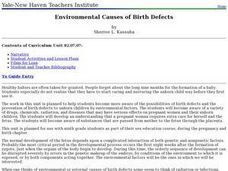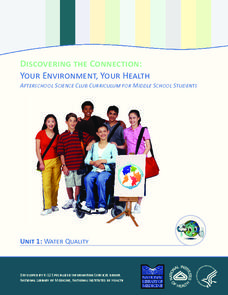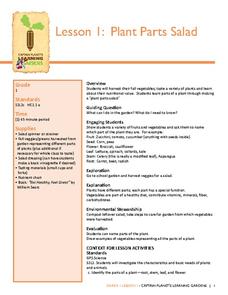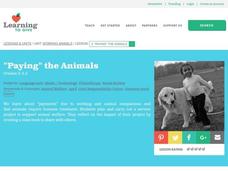Earth Day Network
Staying Green While Being Clean
Clean up the environment with a lesson that focuses on replacing hazardous cleaning supplies with green, environmentally-friendly products. Using a dirty patch of surface as a control area, kids clean other parts of various surfaces...
National Institute of Environmental Health Sciences
A Student Exploration of the Impacts of Climate Change on Human Health in the United States
Let the data drive the science. Learners examine data provided in resources to discover connections between climate change and health of vulnerable populations. They study trends and present findings using their choice of projects.
Kenan Fellows
Unit 1: Introduction to Biotechnology
Biotechnology is big! Introduce the uses of biotechnology to science scholars with a fascinating, fact-filled unit. The first installment in a series of four biotechnology units covers the role biotechnology plays in human and...
Curated OER
Environmental Causes of Birth Defects
Get your high schoolers thinking about the factors that lead to birth defects. They examine how environmental factors and personal choices can cause birth defects in unborn children. They discover the effects of various handicaps such as...
National Library of Medicine
Your Environment, Your Health: Water Quality
How important is water quality where you live? The first module in a six-unit series includes four lessons on water quality. By applying the concept directly to the lives of pupils, they engage in meaningful learning. They read about...
National Library of Medicine
Your Environment, Your Health: Food Safety
Did youknow that chicken causes the greatest risk of food-borne illness. The fourth unit in a six-part series addresses food safety. Scholars research common scenarios of food causing illness through the National Institute for Health....
Curated OER
Environmental Health Hazards and Children
Students are introduced to the environmental hazards their community is facing. In groups, they develop a list of the ways humans have changed the Earth and how these changes have lead to environmental hazards. They record their...
National Library of Medicine
Your Environment, Your Health: The Great Debate—Bottled Water vs. Tap Water in Our School
Should bottled water be sold in schools, or should they only provide tap water? The summative unit in the six-part series encourages scholars debating this topic. The lessons teach how to build an argument, how to gain background...
Beyond Benign
The Green Zine
It's time for your class to advertise what they've learned! The culminating lesson in the 24-part series asks scholars to use their newfound chemistry knowledge to create advertisements. Their magazine advertisements describe the health...
National Library of Medicine
Your Environment, Your Health: Chemicals in Your Home
Many people know about chemical pollution, but are all chemicals bad? The third unit in a series of six addresses chemicals common in everyday life. Scholars learn about the chemicals found in their own homes, chemical safety, and...
National Library of Medicine
Your Environment, Your Health: Runoff, Impervious Surfaces, and Smart Development
Can a sidewalk increase the amount of pollution in local streams? Scholars learn the answer to this question though research and experimentation in the fifth unit in the six-part series. Pupils study runoff, impervious surfaces, and the...
National Library of Medicine
Your Environment, Your Health: Air Quality
Some scientists argue that air pollution now causes more deaths than smoking. The second unit in a six-part series focuses on air quality. Scholars learn what's in the air, how clean the air around their school is, and what they can do...
Captain Planet Foundation
Plant Parts Salad
How are vegetables beneficial to a healthy diet? Have kids examine different types of vegetables, such as zucchini, broccoli, and carrots, and determine which parts of the plant they represent. Then, they taste the vegetables as a...
Curated OER
Biomes of the World (and Canada)
Young scholars explore environments by analyzing food chains. In this biome identification instructional activity, students define a list of environmental vocabulary terms such as tundra, rain-forest and desert. Young scholars create a...
Curated OER
Pollution is Not a Solution
Students explore the environment by completing science worksheets in class. In this water conservation lesson, students identify ways water is used in our society and how we abuse the privilege. Students discuss methods to reduce water...
Curated OER
Theatre Lesson Plan- Tableau (part 2)
Students explore tableaux. In this social studies and fine arts cross curriculum lesson, students work in groups of four to create "frozen" stage pictures (tableaux) representing vocabulary and concepts from a "From Farm to You"...
Curated OER
Is It Breathable?
Students explore air quality. In this environmental lesson, students observe a simulation of air pollution by blowing into a jar (with a straw) that has chalk dust. Students discuss how air quality can effect the way we breathe.
Curated OER
Talking Trash
Define vocabulary related to global waste. Creative thinkers review and illustrate terms for the Global Garbage Picture Dictionary. They play a vocabulary game in which co-operative skills among players in encouraged. A great way to...
Curated OER
Working Animals
Pupils examine the need for the humane treatment of animals. In this animal welfare lesson, students realize the need for animal welfare, and decide on a service project that will promote it. The lesson culminates in the creation of a...
Curated OER
Lead Poisoning and Environmental Health
Students explore issues surrounding lead poisoning. They investigate how and why government agencies and laws were established to protect the public. Students examine the national EPA Elimination Plan. Students design a campaign to...
Curated OER
Organic Mechanic Part I
On day one of the "Organic Mechanic Part I" instructional activity, learners try to remove the waxy coating of an apple and consider pesticides that may be represented by this addition to our food. On day two, they research pesticides...
Curated OER
Nutrition: It's In Your Hands
Fourth graders use this lesson to focus on their health, nutrition and the state of the environment. In groups, they examine the various types of land, water and air pollutants and compare and contrast a food chain with and without a...
Curated OER
How Smoking Affects Our Repiratory System
Seventh graders examine the dangers of smoking. In this life science lesson, 7th graders survey their schoolmates about the factors that would influence them to smoke. They present their findings in class by creating a presentation.
Curated OER
Revised “Understanding Nutrition” Activity
Students evaluate their current food choices. In this health science lesson, students test different drinks to rate the amount of Vitamin C content. They discuss results in class.























